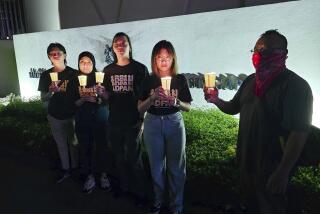Ohio Youth to Be Flogged in Singapore
- Share via
SINGAPORE — In a case likely to strain U.S. relations with a longtime ally on the sensitive issue of human rights, a judge here Thursday sentenced an American teen-ager to be flogged six times with a rattan cane and to spend four months in prison for spray-painting cars and other acts of mischief.
Michael P. Fay, 18, of Dayton, Ohio, was also ordered to pay a $2,230 fine after pleading guilty to two counts of vandalism, two counts of mischief and one count of receiving stolen property. Fay is believed to be the first American ever sentenced to be caned here.
The punishment is far more severe than the word “caning” might imply. A half-inch-thick rattan cane that has been soaked in water is used; it is wielded by an official trained in martial arts.
Prisoners often go into shock during caning, and the punishment leaves permanent scars on their buttocks.
Fay, dressed in a blue T-shirt and dungarees, seemed stunned as the sentence was read in court. His mother let out a wail and burst into tears, while two dozen American teen-agers who packed the court cried and hugged each other.
U.S. Charge d’Affaires Ralph Boyce, who attended the sentencing, expressed displeasure at the severity of the punishment.
“We see a large discrepancy between the offense and the punishment,” he said. “The cars were not permanently damaged; the paint was removed with thinner. Caning leaves permanent scars. In addition, the accused is a teen-ager, and this is his first offense.”
Asked if there would be a diplomatic protest, Boyce said that while the embassy had made clear its concerns over this type of punishment, “we are not going to forecast possible future diplomatic actions.”
Fay, a senior at Singapore-American School, a $10,000-a-year private school for the children of expatriate parents based in Singapore, admitted having been part of a group of boys from the school who spray-painted 18 cars last fall.
He also admitted having tossed eggs at other cars and switching license plates. He admitted possession of stolen property: having in his room signs such as No Smoking and No Exit, which were stolen by the son of a Swedish diplomat.
An Australian youngster facing similar charges in the case has already fled the country, forfeiting bail rather than face caning.
A Malaysian youth who admitted to a smaller number of vandalism charges than Fay was sentenced in juvenile court Thursday to probation. A third youth, from Hong Kong, has pleaded not guilty and faces a trial.
Under Singapore law dating back to efforts in the 1960s to curtail graffiti as a political weapon, caning is mandatory in cases of vandalism when an indelible substance is used. It is left to the court’s discretion to determine whether the substance is considered indelible even if, as in this case, it was removed.
District Judge F. G. Remedios said that while Fay had admitted his crimes and agreed to act as a prosecution witness in future trials against other teen-agers, his acts “could not be condoned as a display of growing pains and schoolboy pranks.”
Fay--who was released Thursday on $48,000 bail while his lawyer prepares an appeal--arrived in Singapore in 1992 to live with his mother and stepfather, an executive with the U.S. courier firm Federal Express.
An American lawyer who attended the trial said he believed that the Singapore government was using the case to send a warning to Singaporeans about the dangers of importing decadent Western ideas. The case has received greater prominence in the controlled Singapore press than do most murder trials. Singapore newspapers published letters calling for the teen-agers to be caned, and a police spokesman was quoted as saying that “punishment for those caught . . . must be sufficiently deterrent.”
Jim Doran, principal of Singapore-American School, said the Fay case had been like a “wake-up call” for other students. “In the past, Singapore society has been very permissive with our kids--it was hands off,” Doran said. “This was a radical, 180-degree departure. That was the shock.”
While Singapore recently has been increasingly tied to the United States for reasons of trade and national security, government ministers have taken pains lately to point up the cultural differences between Asia and the West.
The hit television show “Beverly Hills 90210” was pulled from the government television channel because it was believed to convey approval for what was considered an unacceptable lifestyle. The government announced last month that video games will be subject to the same stringent censorship as films and videocassettes.
Compared to cities in the West, Singapore has almost no problem with graffiti. Its subway system is kept in immaculate condition--the country even banned chewing gum two years ago to avoid gum clogging the doors.
The government believes that tough measures are justified by the country’s crime statistics, which show Singapore to be one of the safest countries in the world.
Caning is mandated in a number of what are considered particularly heinous crimes, which include rape and molestation but also a foreigner overstaying a tourist visa.
More to Read
Sign up for Essential California
The most important California stories and recommendations in your inbox every morning.
You may occasionally receive promotional content from the Los Angeles Times.













